Matcha tea is becoming a popular choice for those looking to boost their brainpower. This vibrant green powder is not only tasty but also packed with nutrients. Drinking matcha tea can improve focus, increase energy, and reduce stress, making it a great addition to any daily routine.
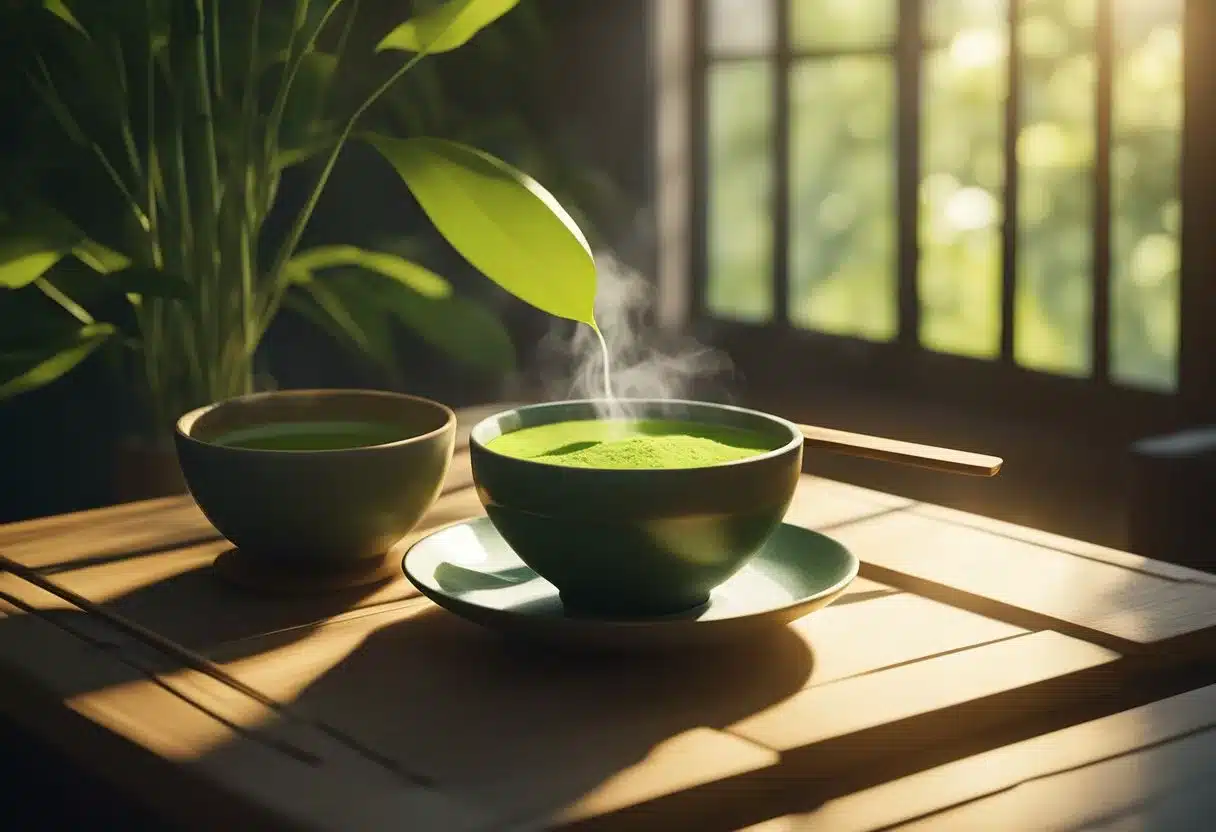
Packed with antioxidants and other healthy compounds, matcha is known for its positive effects on mental performance. It contains caffeine, which helps to fight fatigue and improve concentration. Many people find that starting their day with matcha tea helps them stay alert and productive throughout the day.
Matcha also offers various health benefits beyond brainpower. It supports heart health, protects the liver, and can aid in weight loss. This makes matcha an excellent choice for those looking to enhance their overall well-being while enjoying a delicious and refreshing drink.
Key Takeaways
- Matcha tea improves focus and reduces stress.
- It supports heart health and aids in weight loss.
- Drinking matcha enhances overall well-being.
Exploring Matcha: Origin and Characteristics

Matcha tea is renowned for its deep cultural heritage, carefully cultivated production process, and unique features that distinguish it from other green teas. These key points make matcha a unique and revered tea.
History and Cultural Significance
Matcha’s origins date back over a thousand years. It began in China, where Zen Buddhist monks discovered its calming properties. They brought it to Japan in the 12th century. In Japan, matcha became an essential part of traditional tea ceremonies, known for its meditative benefits.
Japanese tea ceremonies, highly ritualistic and detailed, celebrate matcha’s rich history. These ceremonies reflect the cultural significance of matcha in Japanese society, emphasizing mindfulness, respect, and tranquility.
The Camellia Sinensis Plant
Matcha is derived from the Camellia sinensis plant. This is the same plant that produces all types of tea, including black and white. However, matcha stands out due to its unique processing method.
The leaves used for matcha are carefully selected and handled. They are picked by hand to ensure top quality, and only the youngest, greenest leaves are chosen. This meticulous selection contributes to matcha’s vibrant color and rich flavor.
Shade Growth and Chlorophyll Production
Matcha plants are grown under shade for about three to four weeks before harvest. This shading process increases chlorophyll production in the leaves, giving matcha its bright green color and boosting its nutrient content.
The increased chlorophyll also enhances the tea’s amino acids and sweetness. This process makes matcha unique. The shading is a critical step that differentiates matcha from other teas.
Matcha Versus Green Tea
Although both matcha and green tea come from the Camellia sinensis plant, they are quite different. Matcha leaves are ground into a fine powder, whereas green tea leaves are infused in water and then discarded.
Matcha’s unique production method allows for the consumption of the entire leaf. This provides higher concentrations of antioxidants, caffeine, and nutrients. Matcha contains up to 10 times more nutrients than other green teas, making it a potent option for health benefits.
By understanding these key aspects of matcha, readers can appreciate why it holds a special place in tea culture and wellness routines.
Nutritional Profile of Matcha
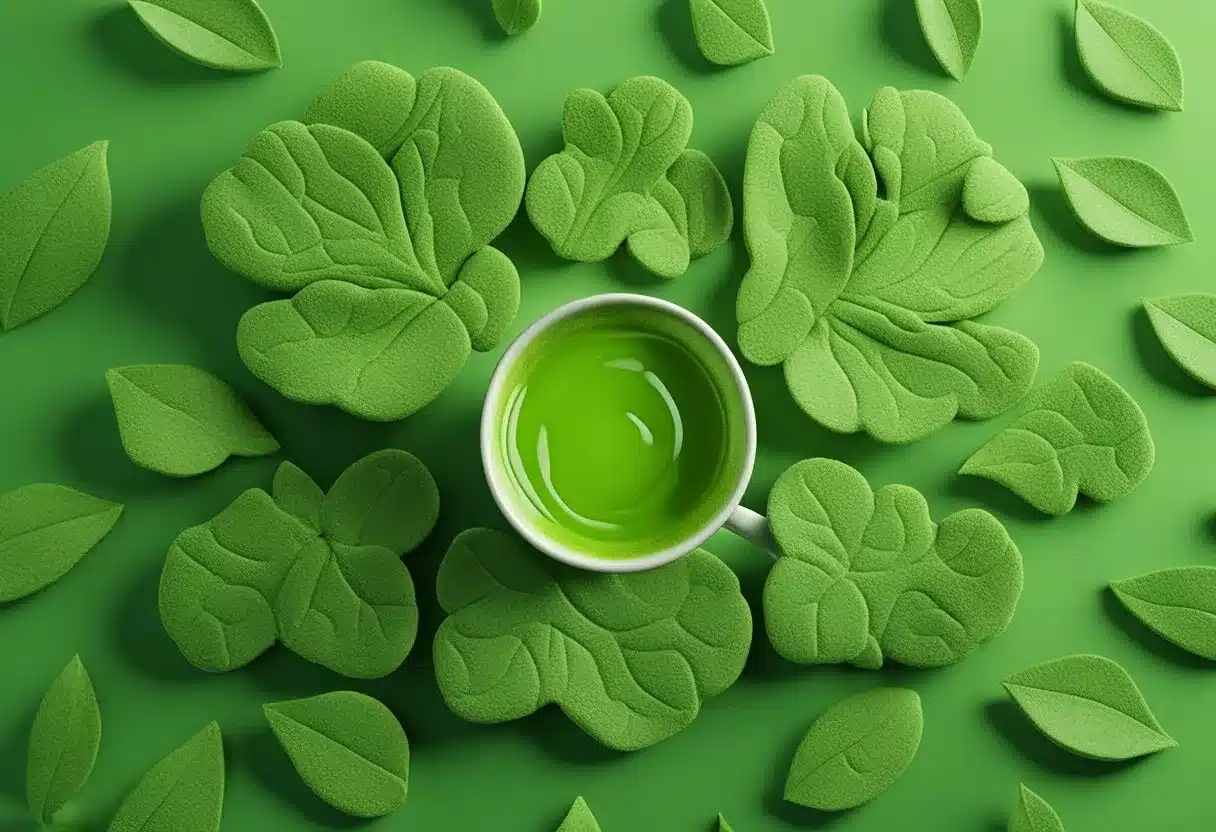
Matcha tea is known for its rich nutrient profile. It contains antioxidants, amino acids like L-theanine, and a variety of vitamins and minerals that all contribute to its health benefits.
Key Nutrients
Matcha powder is packed with a wide array of nutrients. It contains high levels of protein and dietary fiber, which aid in overall health. The powder also has a decent amount of carbohydrates and a very low amount of fats.
A tablespoon of matcha powder typically includes:
- Calories: Around 30
- Protein: 1 gram
- Fiber: 2 grams
These components help in maintaining energy levels and supporting digestive health.
Antioxidants and Catechins
One of matcha’s standout features is its rich concentration of antioxidants. These molecules help protect the body from damage caused by free radicals. Matcha is especially high in catechins, a type of antioxidant.
The most notable catechin in matcha is EGCG (epigallocatechin gallate), which has been linked to various health benefits like reducing inflammation and aiding in weight loss. Regular consumption of matcha can flood your body with these protective compounds.
Amino Acids and Theanine
Matcha is also rich in amino acids, particularly L-theanine. This amino acid is known for promoting relaxation and enhancing mental clarity.
Unlike other types of tea, matcha has a higher concentration of theanine, which can help reduce stress levels and improve focus. The combination of caffeine and theanine results in a balanced energy boost without the jitters often associated with coffee.
Vitamins and Minerals
The tea is a good source of essential vitamins and minerals. It contains:
- Vitamin A
- Vitamin C
- Vitamin E
- Vitamin K
Additionally, matcha provides potassium, calcium, and iron. These nutrients are essential for various bodily functions such as immune support, bone health, and red blood cell production. Including matcha in your diet ensures that you are getting a variety of beneficial vitamins and minerals.
Health Benefits of Matcha

Matcha tea offers numerous health benefits, from boosting brain function and promoting heart health to reducing stress and aiding in weight loss. Let’s explore these benefits in more detail.
Cognitive Function and Brain Health
Matcha tea is rich in antioxidants known as catechins, which may help protect the brain from damage. Drinking matcha can enhance cognitive function, including memory and attention.
The presence of L-theanine, an amino acid, promotes relaxation without drowsiness. This combination improves focus and concentration, making it beneficial for studying or maintaining alertness.
Matcha may also help in the prevention of neurodegenerative diseases like Alzheimer’s disease. Regular consumption supports overall brain health, providing both immediate and long-term cognitive benefits.
Heart Health and Disease Prevention
Matcha is known for its positive effects on heart health. It helps in reducing high blood pressure and cholesterol levels. This, in turn, lowers the risk of cardiovascular disease and stroke.
The antioxidants in matcha, especially catechins, prevent plaque build-up in the arteries, reducing the risk of heart attacks.
Matcha also supports the healthy functioning of the cardiovascular system. Drinking matcha regularly can improve heart health and aid in the prevention of chronic diseases.
Stress, Mood, and Relaxation
Matcha contains L-theanine, which helps reduce stress and promote relaxation. This amino acid increases the production of alpha waves in the brain, inducing a state of relaxation and calmness without causing drowsiness.
Drinking matcha can also improve mood and reduce symptoms of anxiety and depression. The calming effect of L-theanine, combined with caffeine, provides a balanced energy boost.
In short, matcha is an excellent choice for those looking to manage stress and enhance their overall mood and mental well-being.
Weight Loss and Metabolism
Drinking matcha can aid in weight loss and boost metabolism. The catechins in matcha help increase the body’s rate of burning calories, making it easier to lose weight.
Matcha also helps in fat oxidation, meaning that the body can break down and utilize fat more efficiently.
This green tea is a natural and healthy way to support weight management efforts. Regular consumption can lead to both short-term and long-term improvements in metabolism and weight control.
Matcha in Daily Life

Matcha can easily be a part of your daily routine, either through simple drink recipes or creatively adding it to food. This versatile tea offers both nutritional benefits and a unique flavor, making it an exciting addition to your diet.
Incorporating Matcha into Your Diet
Drinking matcha tea daily can provide a steady energy boost and enhance focus. A popular option is the matcha latte, combining matcha powder, hot water, and milk. Some prefer to sweeten it with honey or maple syrup.
Ceremonial grade matcha is best for drinking, as it has a smooth, rich taste. Simply whisk the matcha powder with hot water to create a foamy, vibrant green tea.
Health stores and specialty shops often offer matcha blends that include juices and other nutrient-rich ingredients, making it easier to incorporate matcha into your diet on the go.
Nutrition wise, matcha is rich in antioxidants, particularly catechins, which help in fighting free radicals.
Matcha as a Culinary Ingredient
Matcha is not limited to beverages. It’s a versatile ingredient in the kitchen, adding a unique flavor and vibrant color to various dishes.
In baked goods, like muffins and cookies, matcha can be used to infuse a subtle flavor and a green tint. It pairs well with white chocolate and nuts.
Incorporating matcha into desserts is another popular option. It can be mixed into ice cream, puddings, and even cakes. Matcha’s earthy notes balance out sweet flavors, creating a refined taste.
For a culinary twist, some chefs use matcha in savory recipes, blending it with spices for a unique rub on meats or adding it to soups and sauces.
Premium culinary matcha is recommended for cooking due to its slightly stronger taste, which holds up well when mixed with other ingredients.
Preparing Matcha: Tips and Techniques
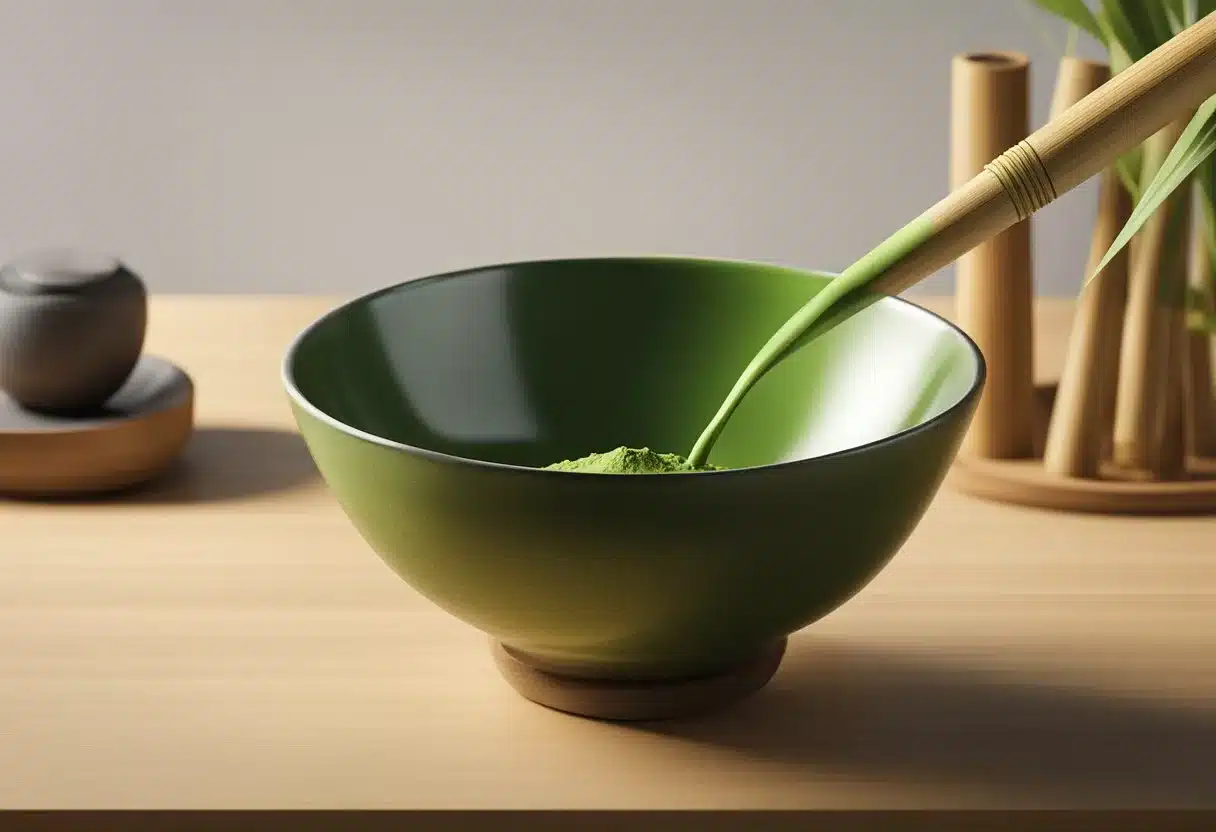
Making matcha tea is a unique process that demands precision and care. Traditional methods use centuries-old tools, while modern approaches bring convenience and creativity. Each way maximizes matcha’s health benefits.
Traditional Preparation
In traditional Japanese tea ceremonies, matcha is prepared with a few specific tools. A bamboo whisk, known as a chasen, is essential for whisking the matcha properly.
To start, sift about 1-2 teaspoons of matcha powder into a bowl to remove clumps. Add a small amount of hot water (around 176°F or 80°C). Then, use the chasen to whisk in a zigzag motion until the tea is frothy.
The key is to create a creamy, velvety texture without any lumps. Choosing the right grade of matcha matters. Ceremonial grade is best for drinking plain, while culinary grade is suited for recipes.
Modern Twists to Matcha Brewing
For those seeking convenience or experimentation, there are various modern methods to prepare matcha. Electric milk frothers or matcha shakers can be used to blend the tea quickly.
Mixing matcha with other ingredients can create delicious lattes, smoothies, and desserts. Add hot water and blend with a milk of your choice to make a matcha latte, or use cold water for iced matcha.
These modern twists allow flexibility in how you enjoy your matcha while still retaining its benefits. Experimenting with different recipes ensures that you can enjoy matcha in numerous ways.
Optimizing Matcha’s Health Benefits
To get the most out of matcha’s health benefits, pay attention to how you prepare and consume it. Matcha is rich in antioxidants and can boost brain function. Drinking it regularly can help improve focus and relaxation.
Avoid using boiling water, as it can make the tea bitter and destroy some of its nutrients. Stay within the optimal temperature range of 176°F or 80°C for the best flavor and benefits.
Additionally, consider pairing matcha with healthy fats like a small amount of coconut oil in your tea. This can help improve the absorption of its antioxidants. Also, drinking matcha on an empty stomach can maximize its effects.
By following these guidelines, you can ensure you’re making the most of matcha’s impressive health benefits while enjoying its vibrant flavor.
Mental Performance and Alertness

Matcha tea offers numerous benefits to mental performance and alertness. It enhances focus and attention, improves memory and learning abilities, and combines unique compounds to create a synergistic effect.
Boosting Focus and Attention
Matcha contains L-theanine and caffeine, which work together to promote mental focus and alertness. The combination of these compounds leads to increased attention, prolonged focus, and better concentration. Compared to coffee, matcha provides sustained energy levels without the typical caffeine crash.
Studies have shown that consuming matcha can boost reaction time, making it easier to stay alert and engaged during tasks that require attention to detail. Regular consumption can improve brain function, helping individuals perform better in their daily activities.
Memory and Learning
The cognitive benefits of matcha extend to memory and learning. L-theanine in matcha not only aids in relaxation but also enhances working memory and learning capabilities.
One study found that taking 2 grams of green tea powder for two months significantly improved brain function. This makes matcha an effective natural supplement for students and professionals aiming to enhance their cognitive abilities and memory retention.
The Synergistic Effects of Matcha’s Compounds
The combination of L-theanine and caffeine in matcha creates a powerful synergy that benefits the brain. L-theanine increases alpha brain wave activity, promoting relaxation without drowsiness. This leads to improved mood and lower stress levels, further supporting mental performance.
Caffeine stimulates the central nervous system, increasing alertness and reducing fatigue. Together, these compounds enhance both energy levels and mental clarity, making matcha a superior choice for boosting brainpower compared to other caffeinated beverages.
For those looking to boost their mental performance and stay sharp throughout the day, incorporating matcha tea into their routine can be a great strategy. It offers a natural way to enhance focus, memory, and overall brain function.
Managing Health Risks and Side Effects
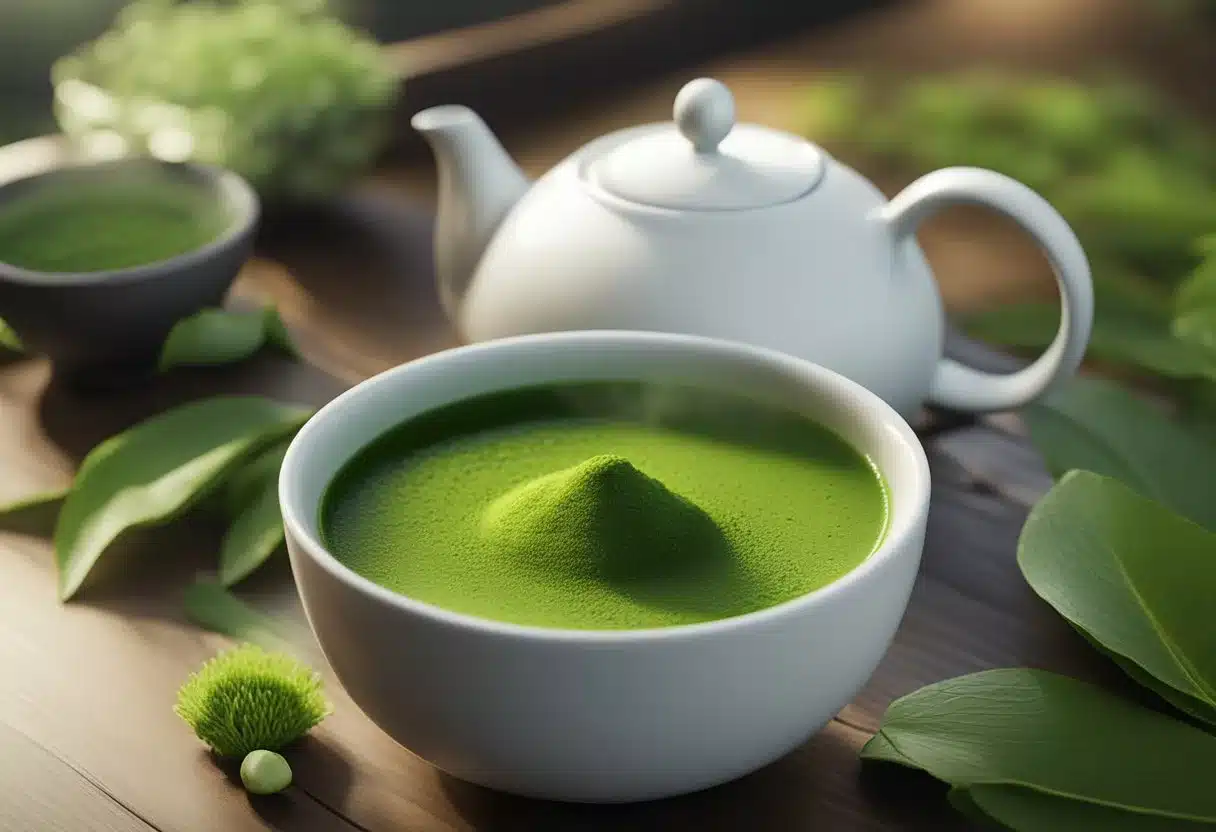
While matcha tea offers numerous health benefits, it is essential to be aware of potential side effects from overconsumption and how to consume it responsibly.
Potential Side Effects of Overconsumption
Consuming too much matcha can lead to several adverse effects. Excessive caffeine intake from matcha may cause headaches, insomnia, and irritability. High amounts of caffeine can also lead to increased anxiety, making it crucial to monitor your intake.
Severe allergic reactions are another concern with overconsumption. Symptoms can include breathing difficulties, itchiness, and rash. Matcha contains high levels of catechins, which are beneficial in moderation but can be harmful in large amounts. Overconsumption of catechins has been linked to liver damage in extreme cases.
Another potential risk is the association between consistently drinking hot tea and a higher chance of developing esophageal cancer. This highlights the importance of moderation and awareness of temperature when consuming matcha.
Best Practices for Matcha Intake
To safely enjoy matcha, it’s important to follow best practices for consumption. Start with a small amount, such as half a teaspoon per day, and gradually increase if you don’t experience any adverse effects. This helps your body adjust to the caffeine and other compounds in matcha.
Drinking matcha in the morning can help enhance your energy and focus without causing sleep disturbances. Pairing matcha with foods rich in vitamin C, like citrus fruits, can improve the absorption of catechins, maximizing their benefits.
Limit matcha intake to 1-2 cups per day to avoid side effects and ensure you’re not consuming excessive caffeine or catechins. Always purchase high-quality matcha from reputable sources to minimize the risk of contaminants and ensure you’re getting the purest form of the tea.
Choosing and Storing Matcha
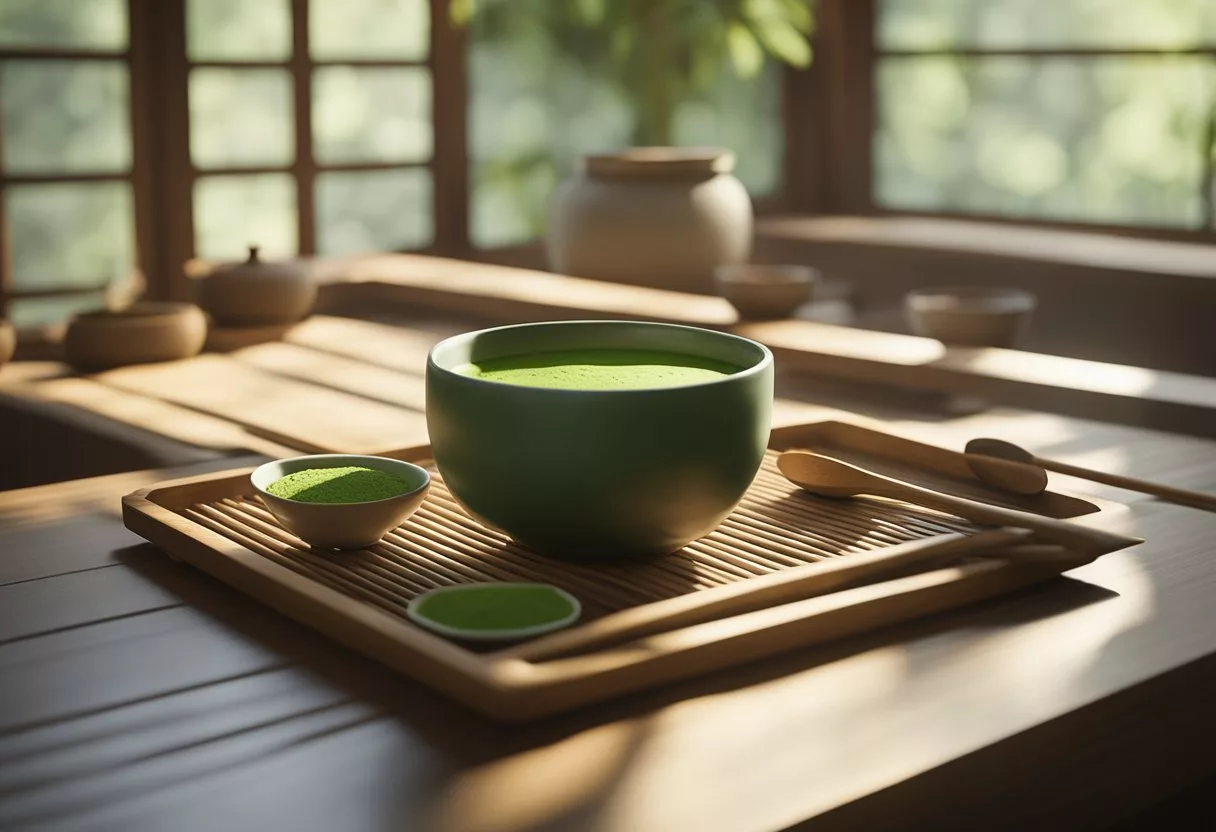
When selecting matcha, it’s crucial to understand the grading system to ensure you’re getting high-quality tea. Proper storage methods also help maintain its freshness and nutrient profile.
Grading System and Quality Indicators
Matcha is graded mainly into ceremonial and culinary grades. Ceremonial-grade matcha is the highest quality, often used in traditional tea ceremonies. It has a vibrant green color and smooth taste with a fine texture. Culinary-grade matcha is slightly lower in quality but still offers a robust flavor, making it ideal for cooking and baking.
Quality indicators to look for include color and texture. High-quality matcha should be bright green, indicating a high chlorophyll content. It should be finely powdered, with a smooth texture that feels silky to the touch. Avoid matcha that appears yellowish or coarse, as this often signifies lower quality.
Taste also plays a significant role. High-grade matcha should taste fresh and slightly sweet with a hint of umami. Lower grades may taste more bitter.
Storage for Preservation of Freshness
Proper storage is essential to maintain matcha’s freshness and nutrient profile. Matcha should be stored in an airtight container to protect it from moisture and light, which can degrade its quality.
Refrigeration is recommended once the container is opened to keep it fresh. Matcha is sensitive to heat, so storing it in a cool, dark place is vital. Ensure the container’s lid is tightly sealed every time you use it.
Avoid metal containers, as they can react with the tea and affect its taste. Opt instead for ceramic or opaque glass containers. If buying matcha in larger quantities, consider dividing it into smaller portions to reduce exposure to air each time the container is opened.
Matcha for Longevity and Overall Well-being

Matcha tea is known for its potential to enhance brain health and support long-term well-being. It is rich in antioxidants and compounds that may improve cognitive functions and promote overall health.
Long-term Cognitive Benefits
Matcha contains a high concentration of epigallocatechin gallate (EGCG), an antioxidant that protects cells from damage. This compound is linked to reducing the risk of age-related cognitive decline and improving brain function. Studies have shown that matcha can aid in memory enhancement and increase focus, which may help with motivation and mental clarity.
Matcha also has L-theanine, an amino acid that promotes relaxation without drowsiness. When combined with caffeine, L-theanine provides a calm alertness, making it a popular nootropic. By mitigating stress and supporting cognitive function, matcha helps in maintaining long-term brain health.
Matcha in Wellness Trends
Incorporating matcha into daily routines is a growing trend in wellness communities. One reason is its potential to support cardiovascular health, which is crucial for longevity. Studies suggest that regular consumption of green tea, including matcha, may lower the risk of cardiovascular diseases.
Furthermore, matcha’s anti-inflammatory properties play a significant role in promoting overall health. The high levels of catechins reduce inflammation and boost the immune system, making it a staple in wellness regimens.
As people seek natural ways to maintain their health, matcha’s role in wellness trends continues to expand. It’s featured in many products, from lattes to smoothies, highlighting its versatility and health benefits.
Frequently Asked Questions

Matcha tea is known for its potential cognitive benefits, impact on mental health, enhancement of focus, and more. Below are some frequently asked questions on these topics.
What are the cognitive benefits of consuming matcha tea?
Matcha tea contains L-theanine and caffeine, which together can improve cognitive function. Studies have shown that this combination may enhance memory, improve reaction time, and increase attention.
How does matcha tea impact mental health when consumed daily?
Drinking matcha tea daily may help decrease stress levels and promote relaxation. L-theanine present in matcha can have calming effects, which support better mental wellbeing and reduce anxiety.
Can drinking matcha in the morning enhance mental clarity and focus?
Yes, consuming matcha in the morning can enhance mental clarity and focus. The caffeine found in matcha provides an alertness boost, while L-theanine ensures a calm, focused energy without the jitters often associated with coffee.
What are the potential side effects of incorporating matcha tea into your diet?
While matcha is generally safe, excessive consumption may lead to side effects such as headaches, insomnia, and digestive issues. It is recommended to consume matcha in moderation to avoid these problems.
How does matcha tea assist with weight loss when prepared correctly?
Matcha tea can support weight loss by boosting metabolism and increasing fat oxidation. It contains catechins, which are known to help burn calories more efficiently during physical activity.
How long does it typically take to notice the effects of matcha on brain function?
The effects on brain function can vary, but some people may notice improvements in focus and attention within 30 minutes of consumption. Regular daily use may lead to more noticeable benefits over weeks or months.